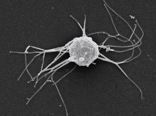필라스테레아
필라스테레아(Filasterea)는 미니스테리아속(Ministeria)과 캅사스포라속(Capsaspora)을 포함하고 있는 생물 분류군이다.[1]
|
| ||
|---|---|---|
 | ||
| 생물 분류ℹ️ | ||
| 역: | 진핵생물 | |
| (미분류): | 단편모생물 | |
| (미분류): | 후편모생물 | |
| (미분류): | 홀로조아 | |
| (미분류): | 필로조아 | |
| 강: | 필라스테레아강 (Filasterea) Cavalier-Smith, 2008 | |
| 목: | 미니스테리아목 (Ministeriida) Cavalier-Smith, 1997 | |
| 과 및 속 | ||
|
| ||
계통 분류
편집다음은 후편모생물의 계통 분류이다.[2][3][4][5]
| 후편모생물 |
| ||||||||||||||||||||||||||||||||||||||||||||||||||||||||||||||||||||||||||||||||||||
각주
편집- ↑ Shalchian-Tabrizi K, Minge MA, Espelund M; 외. (2008). “Multigene phylogeny of choanozoa and the origin of animals”. 《PLoS ONE》 3 (5): 2098. doi:10.1371/journal.pone.0002098. PMC 2346548. PMID 18461162.
- ↑ Peterson, Kevin J.; Cotton, James A.; Gehling, James G.; Pisani, Davide (2008년 4월 27일). “The Ediacaran emergence of bilaterians: congruence between the genetic and the geological fossil records”. 《Philosophical Transactions of the Royal Society of London B: Biological Sciences》 363 (1496): 1435–1443. doi:10.1098/rstb.2007.2233. PMC 2614224. PMID 18192191.
- ↑ Parfrey, Laura Wegener; Lahr, Daniel J. G.; Knoll, Andrew H.; Katz, Laura A. (2011년 8월 16일). “Estimating the timing of early eukaryotic diversification with multigene molecular clocks”. 《Proceedings of the National Academy of Sciences》 108 (33): 13624–13629. doi:10.1073/pnas.1110633108. PMC 3158185. PMID 21810989.
- ↑ Hehenberger, Elisabeth; Tikhonenkov, Denis V.; Kolisko, Martin; Campo, Javier del; Esaulov, Anton S.; Mylnikov, Alexander P.; Keeling, Patrick J. (2017). “Novel Predators Reshape Holozoan Phylogeny and Reveal the Presence of a Two-Component Signaling System in the Ancestor of Animals”. 《Current Biology》 27 (13): 2043–2050.e6. doi:10.1016/j.cub.2017.06.006. PMID 28648822.
- ↑ Tedersoo, Leho; Sanchez-Ramırez, Santiago; Koljalg, Urmas; Bahram, Mohammad; Doring, Markus; Schigel, Dmitry; May, Tom; Ryberg, Martin; Abarenkov, Kessy (2018년 2월 22일). “High-level classification of the Fungi and a tool for evolutionary ecological analyses”. 《Fungal Diversity》 90 (1): 135–159. doi:10.1007/s13225-018-0401-0.
- ↑ 가 나 BCG1 = basal clone group 1, BCG2 = basal clone group 2